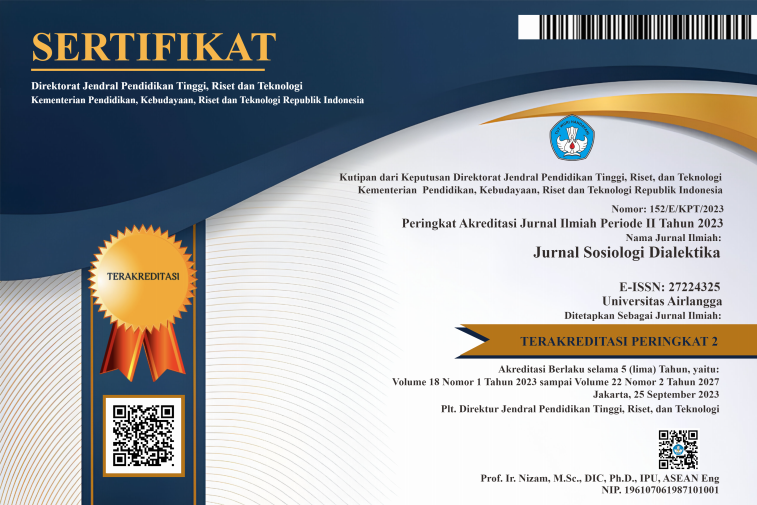Ethnic identity, leadership style on teacher efficacy, and student learning outcomes at the Huaulu ındigenous ınland school, North Seram Island
Downloads
Personality and habits that exist in the group will shape ethnic identity, especially in shaping experiences and leadership roles in the group. Ethnic identity was used to investigate how behavior correlates in terms of leadership style and teacher efficacy when in organizations (schools). This study aims to determine the various influences that appear in all research variables. This study uses the Smart PLS 3 program. The data collection technique uses a questionnaire. Based on the findings of the ethnic identity variable at the Huaulu Interior Elementary School, it shows that only the relationship between ethnic identity and teacher efficacy has a positive and significant effect of 0.755. Ethnic identity has no significant effect on leadership style 0.669. Ethnic identity has no significant effect on student learning outcomes, which is 0.943. Leadership style has no significant effect on student learning outcomes, namely 0.83. Teacher efficacy has no significant effect on student learning outcomes, namely 0.560. This study concludes that ethnic identity has the most significant effect on improving teacher self-efficacy. In the future, this study can become a reference for the development of effective cross-ethnic leadership by adding diversity to develop leader-follower relationships.
Ahmad YYN (2017) Multi-ethnic school environment from the school leader's perspective: Challenges and approaches to improve multi-cultural competency among teachers in Malaysia. Asian Ethnicity 18 (3):296-309.https://doi.org/10.1080/14631369.2016.1225257.
Berry B (2010) The Teachers of 2030: Creating a Student-Centered Profession for the 21st Century.
Blake MK (2019) Self and group racial/ethnic identification among emerging adults. Emerging Adulthood 7 (2):138-149.
Chikaeva KS, Belikova NY, Kasyanov VV, Lyubetsky NP, Zagirova EM, Nagieva MK, & Remikhanova RI (2019) The traditional family: The institutional invariants of development on the South of Russia. Dilemas Contemp Educ Polí Valores 6: 1-19.
Chin JL (2013) Diversity leadership: Influence of ethnicity, gender, and minority status. Open Journal of Leadership 02 (01):1-10. https://doi.org/10.4236/ojl.2013.21001.
Clark MA, Rudolph CW, Zhdanova L, Michel JS, & Baltes BB (2017) Organizational support factors and work–family outcomes: exploring gender difference. Journal of Family Issues 38 (11):1520-1545. https://doi.org/10.1177/0192513X15585809.
Fischer JL, Zvonkovic A, Juergens C, Engler R, & Frederick H (2015) Work, family, and well-being at midlife: a person-centered approach. Journal of Family Issues 36 (1):56-86. https://doi.org/10.1177/0192513X13488370.
Forrest-Bank SS & Cuellar MJ (2018) The mediating effects of ethnic identity on the relationships between racial microaggression and psychological well-being. Social Work Research 42 (1):44-56. https://doi.org/10.1093/swr/svx023.
Gasanova S (2021) Ethnic identity: Peculiarities of interaction between family values and multi-ethnic student environment through the example of Dagestani students. Humanities and Social Sciences Communications 8 (1):1-8. https://doi.org/10.1057/s41599-021-00949-w.
Geerlings J, Thijs J, & Verkuyten M (2019) Preaching and practicing multicultural education: Predicting students' outgroup attitudes from perceived teacher norms and perceived teacher–classmate relations. Journal of School Psychology. https://www.sciencedirect.com/science/article/pii/S0022440519300482.
Ghozali I (2014) Structural Equation Modeling, Metode Alternatif dengan Partial Least Square (PLS), Edisi 4. Semarang: Badan Penerbit Universitas Diponegoro.
Ghufron MN & Risnawita SR (2010) Teori- Teori Psikologi. Yogyakarta: Ar- Ruzz Media.
Gummadam P, Pittman LD, & Ioffe M (2016) School belonging, ethnic identity, and psychological adjustment among ethnic minority college students. The Journal of Experimental Education 84 (2):289-306. https://doi.org/10.1080/00220973.2015.1048844.
Hallinger P & KovaÄević J (2019) Science mapping the knowledge base in educational leadership and management: A longitudinal bibliometric analysis, 1960 to 2018. Educational Management Administration and Leadership 49 (1):5-30. https://doi.org/10.1177/1741143219859002.
Hamalik O (2013) Kurikulum dan Pembelajaran. Jakarta: Bumi Aksara.
Haney-Brown K (2017) The relationship between ethnic identity and leadership style. Walden Dissertations and Doctoral Studies.
Johnston-Guerrero MP (2016) Embracing the messiness: Critical and diverse perspectives on racial and ethnic identity development. New Directions for Student Services 154: 43-55.
Kusumaningtyas N, Atmaja HT & Subagyo (2019) The role of social media, family and school in building Indonesian values to multi-ethnic students at SMP Negeri 2 Pekalongan. Journal of Educational Social Studies 8 (1):19-26.
Mustafaeva M, Mustafaev F, & Mustafaev M (2016) Comparative analysis of modern Dagestan student youth value orientations. Sci Alm Black Sea Region Countries 4 (8):69-73.
Nikolaeva AD & Savvinova VM (2016) Multi-ethnic school in the Russian federation: The preconditions of formation and development (a case study of a national region). International Electronic Journal of Mathematics Education 11 (10):3405-3414.
O'Connor K (2010) Experiential Learning in an Indigenous Context: Integration of Place, Experience and Criticality in Educational Practice. Alberta: Canadian Council on Learning.
Özdemir M & Dil K (2013) Teachers' attitudes toward multicultural education: Case of Çankırı province. Ankara University Journal of Faculty of Educational Sciences (JFES) 46 (2):215-232. https://dergipark.org.tr/en/pub/auebfd/article/445017.
Pittinsky TL (2010) A two-dimensional model of intergroup leadership: The case of national diversity. American Psychologist 65: 195-200.
Rath J & Schutjens V (2019) Advancing the frontiers in ethnic entrepreneurship studies. Tijdschrift Economische en Sociale Geografie 110 (5):579-587. https://doi.org/10.1111/ tesg.12398.
Riaño YPE (2016) International Student Migration (In Oxford). Oxford: Oxford University Press.
Sianturi M, Chiang C, & Hurit AA (2018) Impact of a place-based education curriculum on indigenous teacher and students. International Journal of Instruction 11 (1):311-328. https://doi.org/10.12973/iji.2018.11122a.
Svensson Y, Berne J, & Syed M (2018) A narrative approach to the role of others in ethnic identity formation. Cultural Diversity and Ethnic Minority Psychology 24 (2):187-195. https://doi.org/10.1037/cdp0000182.
Tajfel H (2010) Social Identity and Intergroup Relations. Cambridge: Cambridge University Press.
Verkuyten M & Thijs J (2013) Multicultural education and inter-ethnic attitudes: An intergroup perspective. European Psychologist. https://psycnet.apa.org/record/2013-36215-004.
Zaini AHF (2010) Pembangunan pedesaan. Kementrian Desa, Pembangunan Daerah Tertinggal dan Transmigrasi.

This work is licensed under a Creative Commons Attribution-NonCommercial-ShareAlike 4.0 International License.
1. Copyright of this journal is possession of Editorial Board and Journal Manager, by the knowledge of author, whilst the moral right of the publication belongs to the author.
2. Legal formal aspect of journal publication accessibility refers to Creative Commons Attribution-NonCommercial-ShareAlike (CC BY-NC-SA), implies that publication can be used for non-commercial purposes in its original form (cannot be modified).
3. Every publications (printed/electronic) are open access for educational purposes, research, and library. Other that the aims mentioned above, editorial board is not responsible for copyright violation.















